Inside DBS Newsletter |
March 2012 |
Table of Contents
- Spotlight
- Ipad Supporting the Blind
- Children's Day at the Capitol
- Welcome to Halo
- Transportation Day for the Disadvantaged
- Let's Give the Blind Better Access to Online Learning
- Conklin Center Recruits New Clients
- New Vocational Rehabilitation Employee Training
- Magazines Can Make a Difference to School Age Children
- Behind the Scenes; the Division Online Training System
- District Two Activities
- District Support Group
- 2012 Florida Council of the Blind Scholarships
- Note for all readers
- End Zone
Spotlight
Regional Meetings
By JoAnn Carrin
The Regional meetings involving all Division personnel have been scheduled throughout the state. The purpose of these meetings is to enhance communication among employees and reinforce the Division's Mission to ensure blind and visually impaired Floridians have the tools, support and opportunity to achieve success. The meeting agenda includes discussions on the history of the Division and review of the strategic plan. It is important to revisit the Division of Blind Services (DBS) history to mark our progress and improvements as we chart our course for the future. The strategic plan continues to serve as the steering force that guides us as we move forward.
In addition, it is important for all employees to recognize that their daily work is highly valued and is what drives the Division toward fulfilling our mission and meeting our goals. The meeting schedule requires staff to be out of the office for only one day. I encourage all staff to attend, with the exception of staff necessary for office coverage.
Personnel Actions
We would like to welcome our newest employees to the DBS family:
- Andrea Bennett, Word Processing Systems Operator - Ft. Myers
- Zunaira Wasif, Senior Rehabilitation Specialist - West Palm Beach
- Andrew Bicanovsky, Jr., Maintenance Superintendent I - Rehab Center in Daytona
- Phyllis Heath, Rehabilitation Supervisor - Daytona
- Patricia Thurman, Senior Management Analyst II - State Office
- Donald Meloy, Governmental Operations Consultant - Business Enterprise in Daytona
Congratulations to the following employees who received a promotion:
- Linda Solomon, Rehabilitation Supervisor - Miami
Ipad Supporting the Blind
By Sandra Martin
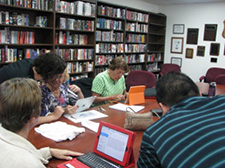 The Visually Impaired Persons of Southwest Florida (VIP) has a new Training Program called: iPad Supporting the Blind. The first class was taught Nov. 10, by Gabino Lares, MA TVI. Lares, an Assistive Technology Supervisor, has a strong desire to provide clients with accessibility to a tablet/e-reader which led him to offer this new class.
The Visually Impaired Persons of Southwest Florida (VIP) has a new Training Program called: iPad Supporting the Blind. The first class was taught Nov. 10, by Gabino Lares, MA TVI. Lares, an Assistive Technology Supervisor, has a strong desire to provide clients with accessibility to a tablet/e-reader which led him to offer this new class.
Lares' desire has brought new beginnings for clients at the VIP. You can hear the excitement in participants' voices. Virginia expressed, "I look forward to it every week!" Judy said, "The class has opened the door to make understanding it easier." Angie smiles as she says, "All of the participants want to adopt Gabino!"
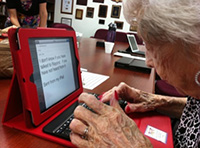 The class emphasizes the accessibility programs (Zoom and Voice Over) and how they work. Additionally, clients will gain the skills needed to enjoy using the built in applications such as iBooks, Email Client, Calendar, Contacts, Notes and Safari, etc., all without having to purchase additional software.
The class emphasizes the accessibility programs (Zoom and Voice Over) and how they work. Additionally, clients will gain the skills needed to enjoy using the built in applications such as iBooks, Email Client, Calendar, Contacts, Notes and Safari, etc., all without having to purchase additional software.
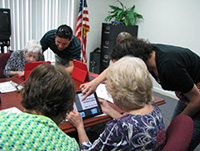 It's no wonder the new iPad class is creating a great deal of excitement. When clients begin to understand all the advantages gained by this training, they know this is an opportunity that will enrich their lives.
It's no wonder the new iPad class is creating a great deal of excitement. When clients begin to understand all the advantages gained by this training, they know this is an opportunity that will enrich their lives.
We at the VIP are very pleased to be involved in training visually impaired and blind persons on accessibility and information using an iPad. A recent donation made to the VIP is enabling us to purchase 20 iPads for staff and clients to use during training. Applications such as iBooks, Email Client, Calendar, Contacts, Notes and Safari without having to purchase additional software.
Children's Day at the Capitol
By La'Verne Scott
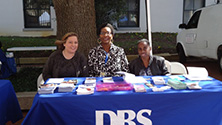 La'Verne Scott, Bertha Hyche, Aimee Mallini and JoAnn Carrin (not pictured) attended the annual Children's Day Program at the Capitol on January 31. This is a featured event every year that highlight's services for children.
La'Verne Scott, Bertha Hyche, Aimee Mallini and JoAnn Carrin (not pictured) attended the annual Children's Day Program at the Capitol on January 31. This is a featured event every year that highlight's services for children.
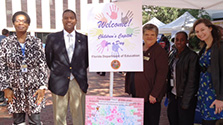 The Division of Blind Services (DBS) has participated in this event for a number of years and it seems to draw more and more children, families and service providers. DBS and the Bureau of Exceptional Education and Student Services (BEESS) employees Jenny Harry and Kelsey Williams were paired together for this event.
The Division of Blind Services (DBS) has participated in this event for a number of years and it seems to draw more and more children, families and service providers. DBS and the Bureau of Exceptional Education and Student Services (BEESS) employees Jenny Harry and Kelsey Williams were paired together for this event.
Commissioner Gerard Robinson stopped by to meet DBS and BEESS employees and commented on the great work that we all do for the citizens of Florida. The day ended with both La'Verne and Bertha obtaining additional resources that will benefit clients of DBS.
Welcome to Halo
By Bryan Mckernan

District one would like to welcome Halo, the newest member of the team in Pensacola. Halo is the new service dog of Gail Christian, and while we are sad to see Gail's dog Danielle leave, Halo has been a wonderful addition to the office.
Transportation Day for the Disadvantaged
By Tiffany Wilson
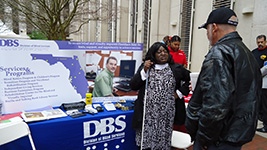 All was bustling at the Tallahassee State Capitol on Thursday, Feb. 2 during the 13th annual Transportation for the Disadvantaged Day. This day is an opportunity to create awareness of the needs for all Floridians to have transportation options in order to retain their independence and have an opportunity for citizens to speak with legislators regarding the importance of laws that facilitate transportation availability, such as funding, and public awareness.
All was bustling at the Tallahassee State Capitol on Thursday, Feb. 2 during the 13th annual Transportation for the Disadvantaged Day. This day is an opportunity to create awareness of the needs for all Floridians to have transportation options in order to retain their independence and have an opportunity for citizens to speak with legislators regarding the importance of laws that facilitate transportation availability, such as funding, and public awareness.
The Division of Blind Services (DBS) demonstrated support for the cause by hosting an information table in the capitol courtyard, and providing the community, legislatures, and service providers information about DBS programs. Johnny Slaton and Tiffany Wilson hosted the public education activities during the event.
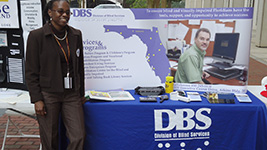 Johnny and Tiffany were delighted with the number of inquisitive patrons who stopped by the DBS display. The guests were greeted with vibrant smiles and an abundance of information on DBS' mission, and available services. Visitors were educated about the level of independence and self-sufficiency exhibited by people experiencing blindness. A great example of this was Tiffany and Johnny, who are both blind and are patrons of some of the transportation services spotlighted in the many presentations to the legislators and community members.
Johnny and Tiffany were delighted with the number of inquisitive patrons who stopped by the DBS display. The guests were greeted with vibrant smiles and an abundance of information on DBS' mission, and available services. Visitors were educated about the level of independence and self-sufficiency exhibited by people experiencing blindness. A great example of this was Tiffany and Johnny, who are both blind and are patrons of some of the transportation services spotlighted in the many presentations to the legislators and community members.
Tiffany remarked, "One of the best ways to educate those who are making the decisions regarding funding allocations, laws, and the importance of the Transportation for the Disadvantaged Programs, is to provide them an opportunity to interact with 'real people' who will be affected by their legislative decisions."
Let's Give the Blind Better Access to Online Learning
By Virginia Jacko, President and CEO, Miami Lighthouse for the Blind and Visually Impaired
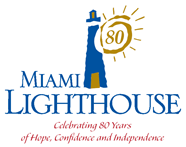 As the Florida Legislature discusses accessibility for high school students taking distance learning classes, I would like to share the following article which is taken from the Chronicle of Higher Education (May 8, 2011).
As the Florida Legislature discusses accessibility for high school students taking distance learning classes, I would like to share the following article which is taken from the Chronicle of Higher Education (May 8, 2011).
In an age when technology could help overcome barriers for blind students, colleges and universities have failed to address this issue adequately. I first expressed concern about digital accessibility more than 10 years ago, when I was employed at Purdue University. Purdue adopted an online-purchasing system that was not accessible to blind or visually impaired users. I alerted the software designers and the company's president of the issue but they were unaware of the problem.
Computer instructors at Miami Lighthouse for the Blind and Visually Impaired have received complaints from students about the lack of online accessibility at Florida colleges. Other accessibility complaints reported involve e-mail attachments. When using screen readers a scanned document is just like a picture therefore it reads as "blank." Miami Lighthouse has formed partnerships with software companies as a test site for other kinds of accessible technology, and we would welcome the opportunity to work with developers on accessible courseware and other learning technology.
Federal standards Section 508 require keyboard-enabled interfaces. The technical standards for software are clear. When software is designed to run on a system that has a keyboard, product functions should be readable by screen-reading software like JAWS. In addition, all graphic elements on Web pages must have a textual description this includes accessibility of online forms.
We know that better online access for the blind is possible. It is vital for our clients to know they can regain the ability to use computers, phones, and other electronic devices for work, education, socializing-everything the sighted world use. We are living in a world that has fully embraced digital technology and media, and the blind and other disabled people have the right to participate in it fully.
Conklin Center Recruits New Clients
By Shelanda Shaw

The Conklin Center's mission is to empower children and adults who are blind and have one or more additional disabilities to develop their potential to be able to obtain competitive employment, live independently and fully participate in community life. The Center is a residential facility located in Daytona Beach. The services are provided under a statewide contract with the Division of Blind Services (DBS).
Due to a number of recent graduations, the Center is now seeking new students. The Conklin Center helps clients reach employment outcomes for the most significantly disabled people. Evaluations for referrals can be scheduled immediately.
Vocational Rehabilitation consumers over the age of 18 who are blind and have additional disabilities are eligible for the program. Now is an excellent time to take a look at caseloads to see if there are consumers who may benefit from a comprehensive assessment and possibly participate in Conklin's residential program. Visit the Conklin Center website at info@conklincenter.org for additional information.
New Vocational Rehabilitation Employee Training
By Shelanda Shaw
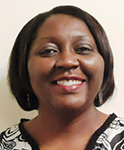
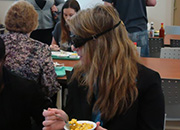 The first training session for new vocational rehabilitation (VR) employees was held Feb. 1-2, at the Rehabilitation Center for the Blind and Visually Impaired in Daytona. Shelanda Shaw and Ginger Lancaster played the leading role in bringing this training program to the Division. The purpose of the training is to promote awareness and to understand the role of the Division of Blind Services (DBS) as it pertains to the implementation of vocational rehabilitation services to visually impaired and blind individuals.
The first training session for new vocational rehabilitation (VR) employees was held Feb. 1-2, at the Rehabilitation Center for the Blind and Visually Impaired in Daytona. Shelanda Shaw and Ginger Lancaster played the leading role in bringing this training program to the Division. The purpose of the training is to promote awareness and to understand the role of the Division of Blind Services (DBS) as it pertains to the implementation of vocational rehabilitation services to visually impaired and blind individuals.
This was accomplished by providing hand on activity and presentations. Presenter from the Rehabilitation Center included Edward Hudson, Ginger Lancaster, Steve Moss, Renea Keough, Holly Idler, Steven Perry, Cassandra Jessie, Caroline McEwen, and Randy Randall. Susan Roberts and Marcel Carroll made a presentation about the Talking Books Library. We were also pleased to have Jim Woolyhand, District Administrator, and Ronnie Silverman, Executive Director, Center for the Visually Impaired, talked with participants about the working relationships between district offices and CRPs.
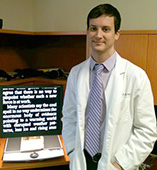
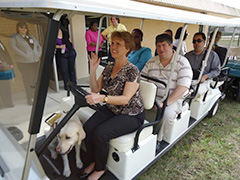 Two of the speakers, Dr. Christopher Choat, Low Vision Optometrist, and Ms. Bonnie Smith, Occupational Therapist and Certified Low Vision Therapist, presented information on eye conditions and visual functioning, as they highlighted an array of low vision devices.
Two of the speakers, Dr. Christopher Choat, Low Vision Optometrist, and Ms. Bonnie Smith, Occupational Therapist and Certified Low Vision Therapist, presented information on eye conditions and visual functioning, as they highlighted an array of low vision devices.
DBS staff, Lynn Ritter, Program Consultant, presented an overview of VR policy and Ivy Romero, District Administrator, highlighted the importance of good customer service with the "Give'em the Pickle" training. All reports indicated that the training was successful; therefore, we plan to hold sessions for new VR employees every six months.
Magazines Can Make a Difference -- To School Age Children
By Dorothy Minor
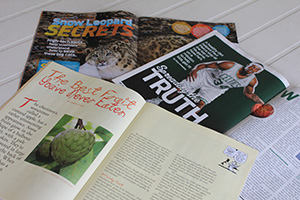 Did you subscribe to a magazine when you were young? If you did you may remember waiting eagerly for your magazine to arrive. The Bureau of Braille and Talking Books Library and National Library Service offer free subscriptions to a number of magazines of interest to school age children. Humpty Dumpty's Magazine is aimed at the youngest readers, kindergarten to early school years. Humpty Dumpty features stories, poems, jokes and games in audio format. Spider is written for beginning readers 6 to 9 years old. It features stories, poems, jokes and crafts and it is available in audio, press Braille and digital Braille.
Did you subscribe to a magazine when you were young? If you did you may remember waiting eagerly for your magazine to arrive. The Bureau of Braille and Talking Books Library and National Library Service offer free subscriptions to a number of magazines of interest to school age children. Humpty Dumpty's Magazine is aimed at the youngest readers, kindergarten to early school years. Humpty Dumpty features stories, poems, jokes and games in audio format. Spider is written for beginning readers 6 to 9 years old. It features stories, poems, jokes and crafts and it is available in audio, press Braille and digital Braille.
More advanced readers can subscribe to Cricket and National Geographic Kids produced on the same audio cassette. Cricket features stories, poems, and articles by internationally known authors, songs, jokes, and crafts. National Geographic Kids features articles about people, places, customs, animals and plant life. Boy's Life, published by Boy Scouts of America is available in press Braille and digital Braille. Boys Life contains articles about the outdoors, sports, hobbies, adventure fiction and humor.
Stone Soup: The Magazine by Young Writers and Artists publishes stories, poems, illustrations and book reviews created by children through age 13 and is available in press Braille and digital Braille. Sports Illustrated for Kids, published in audio for ages 8 to 13, features articles on sports personalities, events, youth who excel in sports, and controversial sports related issues.
Odyssey: Adventures in Science, for ages 10 to 16, is available in audio. Each issue focuses on a single theme related to earth science and space.
Muse: The Magazine of Life, the Universe, and Pie Throwing, published in press Braille and digital Braille offers science, art, archeology and history activities, book reviews and contests for ages 10 to 15.
Digital Braille titles may be accessed through WEB-Braille, a free Internet service available to eligible readers, for download or use online with Braille output devices.
Behind the Scenes; the Division Online Training System
By Aimee M. Mallini
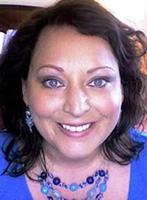 It might seem surprising, but face-to-face is not always the most effective or efficient method of training. For an employee, adjusting your schedule to attend trainings can be challenging at best. With online training there are options and flexibility for the learner which is necessary in today's busy world.
It might seem surprising, but face-to-face is not always the most effective or efficient method of training. For an employee, adjusting your schedule to attend trainings can be challenging at best. With online training there are options and flexibility for the learner which is necessary in today's busy world.
 To provide quality training specific to the Division of Blind Services (DBS) and to provide scheduling flexibility, the Division launched its online training system using Adobe Connect software in the fall of 2011. The purpose of the system is to train employees on compliance with state and federal laws, to increase employee working knowledge, and to promote satisfaction and retention.
To provide quality training specific to the Division of Blind Services (DBS) and to provide scheduling flexibility, the Division launched its online training system using Adobe Connect software in the fall of 2011. The purpose of the system is to train employees on compliance with state and federal laws, to increase employee working knowledge, and to promote satisfaction and retention.
These courses are designed and created in-house, each course taking several months to develop from start to finish. This is only made possible by a collaborative effort of many. The creation process includes research and information gathering, PowerPoint creation, script creation, narrative recording, audio editing, publishing and testing by sighted, low vision and blind users.
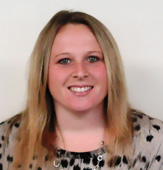 When you take the courses, if you wonder who the great voice belongs to, it is Kendra Jahnke from MIS. Kendra has spent countless hours recording the course narratives. We are also fortunate to have the assistance of Adam Gaffney who created and continually updates the screen reader guide as well as providing user support. The list of others who review the training drafts many times each is too long to print.
When you take the courses, if you wonder who the great voice belongs to, it is Kendra Jahnke from MIS. Kendra has spent countless hours recording the course narratives. We are also fortunate to have the assistance of Adam Gaffney who created and continually updates the screen reader guide as well as providing user support. The list of others who review the training drafts many times each is too long to print.
Thus far the reports are that the system is a great success. Training deadlines are met successfully with limited obstacles reported. Future courses, in the creation process will include Travel Procedures and Code of Ethics. We look forward to all feedback and to providing you with quality trainings that will enhance your working knowledge.
District Two Activities
By Ana Saint-Fort On Feb.11, the Early Learning Coalition of the Big Bend sponsored the "Children's Community Outreach Program" where providers within the community collaborated and gathered resource information for our children and their families. La'verne Scott represented the Division of Blind Services (DBS) District Two at this event in Tallahassee at the Turnbull Conference Center on the Florida State University campus.
In Tallahassee on Feb. 23, Tiffany Wilson and Bertha Hyche attended the Project 10 Transition Education Network for Region I. Several community organizations that serve Transition students gathered and shared resources that will improve students' academic success and post educational outcome. For more information regarding Project 10 visit their website at www.Project10.info
District Support Group
By Bryan Mckernan
District One Support Group meetings, led by Whitney Paine, continue to be a success. The last meeting had the most participants thus far. Janet Bernhardt CLVT, TVI, from Low Vision Etc., taught the group members various ways to adapt to recreational activities including sewing, fishing, and gardening. Those in attendance included Division of Blind Service staff, Independence for the Blind of West Florida staff, and clients.
2012 Florida Council of the Blind Scholarships
By Shelanda Shaw
The Florida Council of the Blind (FCB), a state affiliate of the American Council of the Blind (ACB), is a statewide organization of blind people working to make life better through public education, legislative actions, and providing a statewide information and referral service through Project Insight.
FCB is also an organization designed to provide resources to the visually impaired community. They offer educational, social, and economic opportunities specific to the needs of blind individuals.
The 2012 Florida Council of the Blind Program offers scholarships totaling $4,500, which are offered to outstanding students who are enrolled in academic education, professional or technical training beyond the high school level. The scholarships are:
- The $2,000 Gayle M. Krause-Edwards Scholarship offered to an outstanding college student;
- The $1,000 Teresa Blessing Scholarship offered to a high school student exhibiting academic and leadership excellence;
- The $1,000 Timothy Turpin Scholarship is available to an eligible applicant who is enrolled in a course of study which will increase advancement potential in his/her chosen field, and
- The $500 Bobbie Probst Scholarship to be awarded to an eligible applicant who is enrolled part-time in a college, university or in a technical institute.
All applicants must have at least a 3.0 grade-point average with the exception of the Gayle M. Krause-Edwards Scholarship which requires a 3.2 grade-point average and completion of one semester in a university or college.
Please visit www.fcb.org for additional scholarship requirement information. The deadline to apply for all scholarships is midnight on March 31.
Note for all readers:
Thank you for your enthusiastic support of the Inside DBS Newsletter. The March edition is the longest this year. We appreciate all the contributions and efforts made by each of you to submit of articles prior to the 24th of each month. In an effort to streamline article submission and editing, we also request that the length of articles be between 250 - 300 words. Thank you for your continued support and we look forward to reading many more articles about our staff, clients and partners.
End Zone
We hope you found this month’s newsletter interesting. Remember, we need your submissions each month. Let us know what’s going on in your district or facility. The publication date for the Inside DBS newsletter is the first of each month. The deadline for submissions is the 24th of each month. Comments, suggestions, and submissions should be directed to:
Ashley Evans
Email: Ashley.Evans@dbs.fldoe.org
Phone: 850-245-0310
Additional useful links and telephone numbers:
To request a Braille version of this edition of Inside DBS may contact the Braille and Talking Book Library at al.peterson@dbs.fldoe.org or call 800-226-6075.
MIS Help Desk:
Phone: 850-245-0360
Email: DBS.HelpDesk@dbs.fldoe.org
AWARE Help Desk:
Phone: 850-245-0395 or 1-866-841-0912
Email: Aware.support@dbs.fldoe.org
DBS Division of Blind Services (external): https://dbs.fldoe.org.
